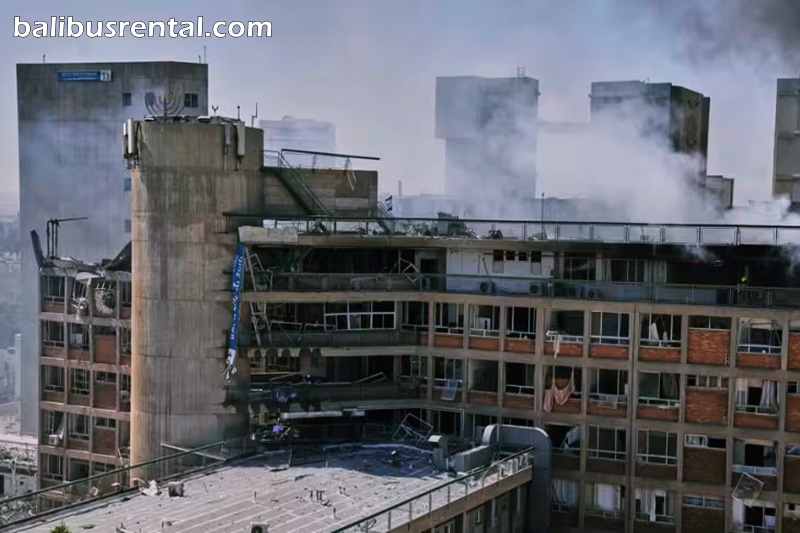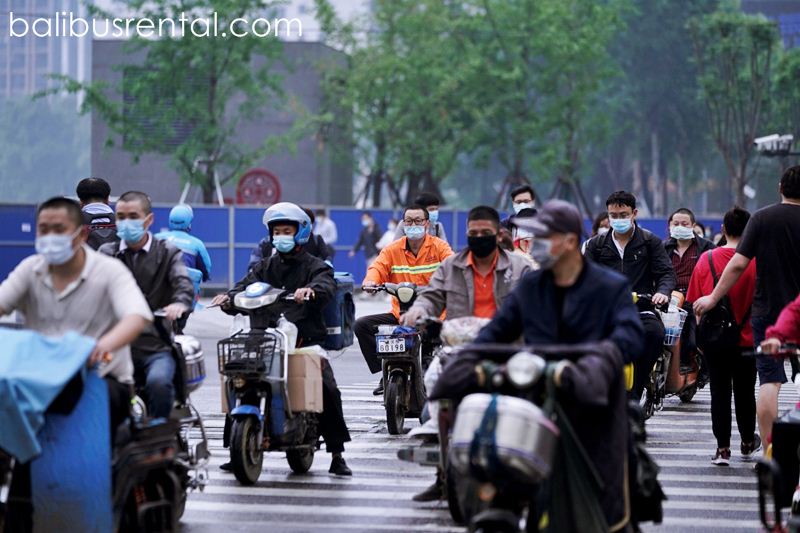Thursday | June 19, 2025
WASHINGTON/DUBAI/JERUSALEM, June 19 – Tensions in the Middle East reached a dangerous new peak on Thursday as Israel launched a direct strike on a key Iranian nuclear facility, while Iran responded with missile attacks that struck an Israeli hospital, killing and injuring civilians. The dramatic escalation marked one of the most severe military confrontations between the two longtime enemies and raised urgent questions about potential U.S. involvement.
As the world watched anxiously, U.S. President Donald Trump remained deliberately ambiguous about whether the United States would join Israel’s military campaign. Speaking to reporters in Washington, Trump said he was “closely monitoring the situation,” but declined to clarify if American forces would participate in airstrikes against Iranian nuclear targets. “All options are on the table,” he said, reiterating U.S. opposition to a nuclear-armed Iran but stopping short of committing troops or aircraft.
In Tel Aviv, Israeli Prime Minister Benjamin Netanyahu declared that Israel would not halt its offensive until Iran’s nuclear threat was entirely neutralized. “The tyrants in Tehran will pay the full price for threatening the existence of the Jewish state,” Netanyahu said during a televised address. He emphasized that this was Israel’s most extensive military campaign against Iran to date, and one he believed could ultimately lead to the collapse of the Islamic Republic’s leadership.
Israeli Defence Minister Israel Katz echoed the prime minister’s hardline stance, announcing that the Israel Defense Forces (IDF) had been ordered to “intensify operations against strategic military and nuclear infrastructure in Tehran and beyond.” He said the objective was clear: to dismantle Iran’s ability to develop nuclear weapons and to undermine the rule of the clerical regime.
Over the past week, a relentless series of Israeli air and missile attacks has targeted Iranian command centers, missile storage facilities, and key nuclear sites. The Israeli military claims that the offensive has eliminated numerous high-ranking Iranian military leaders, significantly degraded Iran’s nuclear development capabilities, and caused extensive casualties, with hundreds reported dead.
In retaliation, Iran launched a barrage of missiles at Israeli cities, including a direct hit on a hospital in northern Israel, which killed at least 12 civilians and wounded dozens more. The Iranian government said its strikes were legitimate acts of self-defense and a response to what it called an act of war by Israel.
The most significant Israeli target struck overnight was the Khondab nuclear complex near Arak, home to a partially-built heavy-water research reactor. Heavy-water reactors are capable of producing plutonium, a critical ingredient in nuclear weapons. According to Israeli military sources, the facility was heavily damaged, though Iranian media downplayed the extent of the impact. Iranian officials confirmed that two projectiles had landed near the site but insisted there was no radiation leak or danger to the public.
In a separate operation, Israeli warplanes also struck targets near Natanz, one of Iran’s most heavily fortified nuclear sites. The Israeli military claimed the location contained “components and specialized equipment used in the development of nuclear weapons,” though Iran denied these allegations.
The Atomic Energy Organisation of Iran (AEOI) condemned the attacks as a “blatant violation of international law” and stated that no casualties had occurred because personnel had been evacuated ahead of time. AEOI insisted that Iran’s nuclear program remained peaceful and was solely intended for civilian energy and medical purposes.
Despite the escalation, Tehran has not yet signaled an intent to declare all-out war. However, the tone of officials in both countries suggests that the conflict is far from over, and the region remains on high alert. International actors, including the United Nations, Russia, and China, have called for an immediate ceasefire and diplomatic dialogue to prevent further bloodshed.
As of Thursday evening, Israel’s offensive appears to be ongoing, with air raid sirens still sounding in several parts of Iran and Israel. Meanwhile, global powers watch with bated breath, concerned that a broader regional war — or even a nuclear confrontation — may be imminent if the situation spirals further out of control.
MISSILES DAMAGE HOSPITAL IN ISRAEL
The Middle East edged closer to all-out war on Thursday after Iran launched a barrage of missiles into Israeli territory, striking civilian areas and a major hospital in the southern city of Beersheba. The unprecedented attack, confirmed by both Iranian and Israeli officials, represents a dangerous escalation in the conflict between the two regional powers.
According to an Israeli military spokesperson, several Iranian missiles hit densely populated areas early Thursday, including near Soroka Medical Center, one of Israel’s largest hospitals. Iran’s Islamic Revolutionary Guard Corps (IRGC) claimed it was targeting Israeli military and intelligence installations allegedly operating in the area. Soroka Hospital confirmed it sustained structural damage, although the extent of the casualties inside remains unclear.
This marks the first time in decades of conflict – largely waged through proxies and covert operations – that a large number of missiles fired directly from Iran have breached Israel’s advanced missile defense systems, resulting in civilian casualties in Israeli cities.
Israeli emergency services reported at least five people seriously injured and dozens more wounded across three different locations. In south Tel Aviv, rescue workers rushed to pull people trapped under rubble after a missile struck a residential building. Explosions and missile trails were visible over Tel Aviv, with the Iron Dome and other missile defense systems intercepting multiple projectiles mid-air. Despite these efforts, several missiles hit central and southern regions, causing widespread destruction.
The Ramat Gan area near Tel Aviv, a commercial and residential hub filled with high-rise towers and foreign consulates, was among the worst hit. One local resident, Yaniv, 34, described a powerful explosion that shook his apartment tower: “It’s very scary… The whole building shook. The sound was deafening.”
The proximity of the strike to foreign embassies and diplomatic missions – many of them European and African – raised alarms about the safety of foreign nationals. Several diplomatic staff were evacuated as a precaution.
The intensifying violence has driven global fears of a broader regional war, one that could involve superpowers and destabilize international energy markets. Oil prices surged sharply in the aftermath of the Israeli strikes on Iranian nuclear sites, reflecting market anxiety over the security of Middle East oil supplies.
Israel, possessing the most advanced military in the region, has conducted coordinated strikes on Iran’s nuclear infrastructure and its regional allies, including Hamas in Gaza, Hezbollah in Lebanon, and the Houthis in Yemen, in a widening military campaign following the October 7, 2023 Hamas attack that ignited the ongoing Gaza war.
Meanwhile, in Washington, President Donald Trump continued to project uncertainty about the U.S. role in the conflict. Speaking outside the White House on Wednesday, Trump declined to say whether he had decided to join Israel’s campaign against Iran. “I may do it. I may not do it. Nobody knows what I’m going to do,” he said cryptically.
Trump also claimed that Iranian officials had reached out for a possible meeting in Washington. “We may do that,” he said, before adding, “It’s a little late.”
While Trump floated the possibility of diplomacy, he also posted inflammatory remarks on social media earlier in the week, including a threat against Iran’s Supreme Leader, Ayatollah Ali Khamenei, and a call for Iran’s “unconditional surrender.” These mixed signals have caused confusion among allies and critics alike, and delayed any coherent U.S. response to the conflict.
Planned nuclear talks between Washington and Tehran, originally scheduled for last Sunday, have been cancelled amid the escalating violence. Tehran has said it will not engage in negotiations while under military attack.
In a last-ditch effort to de-escalate tensions, the foreign ministers of Germany, France, and Britain plan to meet with Iranian Foreign Minister Abbas Araqchi in Geneva on Friday to explore the possibility of restarting nuclear diplomacy, according to a German diplomatic source.
Inside Trump’s camp, internal divisions are reportedly growing. A source familiar with White House deliberations said Trump and his advisors are actively weighing military options, including joining Israel in direct strikes against Iran’s nuclear infrastructure. However, the idea of launching another major war in the Middle East has triggered pushback from elements of Trump’s political base, many of whom oppose deeper U.S. entanglement overseas.
With diplomatic solutions rapidly narrowing and hostilities continuing to escalate, the world watches with mounting concern, fearing that the current tit-for-tat strikes may soon spiral into a regional or even global conflagration




